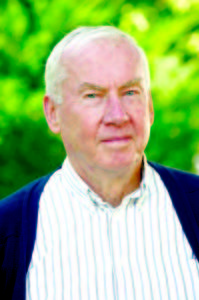Small World: A Modest Proposal for Politics
BN Columnist
When Brunswick Superintendent of Schools Perzanoski quarreled recently with Governor Paul LePage over education policy, he suggested that the governor take a SAT test and make the results public. That remark was widely condemned as a personal insult.
I think the educator was on to something.
I think all candidates for high office should demonstrate their qualifications by taking and passing an examination to test general knowledge, intelligence and readiness for the position sought. A bit of full disclosure:
I spent most of my working life in government service. Starting with the U.S. Navy and continuing with civilian agencies and ending with the Department of State, I would never have been hired by any of them had I not passed the requisite exam. With the Navy and the State Department, I had also to pass an oral examination, a medical exam and be cleared by security. I would not expect a politician to be subject to anything other than a written exam; voters would see to the other standards.
Let’s assume that a law is passed that requires an examination for aspirants to the House of Representatives and Senate. (Fat chance with the present bunch; I am obviously thinking of the legislators after the next American Revolution.) The Senate test would need to be somewhat harder, for it is the senior body. The results would be published for those candidates who were successful; failed aspirants would go back to whatever they were doing in life. Once past that hurdle, an elected candidate would not have to repeat the test unless a congressman aspired later to the Senate.
Anyone who chose to run the presidency, for vice president or who was nominated for the Supreme Court or the Cabinet would also have to complete the examination process before proceeding to the voters or Senate approval. The entire system would be administered by a new federal agency (staffed, to be sure, by exam passers). States like Maine would set up their own systems or face opprobrium and insult.
Why should our government move to a system of politician selection, in part, by examination? The Founding Fathers never even thought of the possibility. Well, those wise men of highest character (as far as we know) had great confidence in the sharp minds of simple voters. They couldn’t possibly have imagined the kinds of losers who one day would be elected to office.
History teaches us, however, that even the sharpest of voters are often unable to recognize a congressman who cannot understand the workings of the economy or who is ignorant of the basic facts of female reproductive life. How is it that we have in government politicians who are ignorant of standards of truthfulness or honesty? Do we want serving in Washington leaders who can’t match the British, say, in debating skills? Why should we have to suffer men and women entrusted with our destinies who are drunks, nude swimmers, war mongers, spendthrifts or otherwise just plain embarrassing?
Then there is the public burden of long-term incumbency. If a politician is going to stay in office as long as a civil servant, he should pass an exam just like one of them. Thinking ahead about long-termers, we might want to write into the legislation a provision that would require re-examination after 12 years to guard against a lapse into senility while still on the job.
We know full well, you will say, that the most brilliant politician might be the biggest crook and liar. How do exams protect us from them? First, no conceivable device will change human nature or extinguish its flaws. Membership in a truly elite body, however, might just shame some to adhere to higher standards.
A second thought occurs. Perhaps I am going at this problem from the wrong end. Perhaps it is voters who should be required to pass a test that measures intelligence, general knowledge and judgment. We could then relax as the Fathers did, confident in the wisdom of the common man.
I fear, alas, that if we go down the road of governance by only qualified voters, the movement might be hijacked by traditionalists who would push for a property ownership standard for casting ballots. Or, if the modern Supreme Could were asked, they might say that just as money is speech, so should money vote: a million dollars should equal a million votes.
No, ’tis better that we subject our politicians only to the exam process — carefully monitored, of course.
Henry Precht is a retired Foreign Service Officer and the author of “A Diplomat’s Progress.â€


